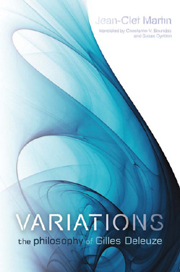Book contents
- Frontmatter
- Contents
- Letter-Preface by Gilles Deleuze
- Preambles
- First Variation: Ethics and Aesthetics
- Second Variation: Three Poetic Formulas for Nomadic Distribution
- Third Variation: Multiplicities
- Fourth Variation: Malcolm Lowry, or, the Manifesto of Things
- Postscript to the Anglo-American Edition: What is a Multiplicity?
- Notes
- Bibliography
- Index
Postscript to the Anglo-American Edition: What is a Multiplicity?
Published online by Cambridge University Press: 12 September 2012
- Frontmatter
- Contents
- Letter-Preface by Gilles Deleuze
- Preambles
- First Variation: Ethics and Aesthetics
- Second Variation: Three Poetic Formulas for Nomadic Distribution
- Third Variation: Multiplicities
- Fourth Variation: Malcolm Lowry, or, the Manifesto of Things
- Postscript to the Anglo-American Edition: What is a Multiplicity?
- Notes
- Bibliography
- Index
Summary
To give centre stage to the movement of variation in Deleuze's philosophy is paramount for what Deleuze calls creation of concepts. A variation is possible only by virtue of the liaison established within a multiplicity, and in accordance with a compositional plane or an original conceptual method. But a multiplicity is not only composed of elements and parts. Deleuze does not envisage the multiple in the way Alain Badiou sees it – by distinguishing the elements of their relationships (or parts) within a set, while fully aware that the latter are more numerous than the rest and require a line for the overflow to drift. Deleuze does not think in terms of number or surplus. His thinking is more algebraic.
Undoubtedly, Deleuze remembers Descartes' account of space in his renewed approach to extension through the creation of dimensions. The Cartesian space is directional and dimensional, having vectors and reference points. Here, the approach is not based on the enumeration of elements and parts. Its precise construction is a multiplicity and a cartography that comprise longitude and latitude, initially qualified as coordinates rather than expressed by a magnitude: a line will be defined by a single coordinate, a plane will require two, a volume will presuppose a supplementary coordinate, and nothing prevents us from having access to objects with infinite coordinates. We should note that all these relationships vary through functions and variables that Descartes, rather than applying numerical terms, will call y or x, because the latter receive very different determinations and engage in problems that are not yet associated with numbers.
- Type
- Chapter
- Information
- VariationsThe Philosophy of Gilles Deleuze, pp. 215 - 216Publisher: Edinburgh University PressPrint publication year: 2010



